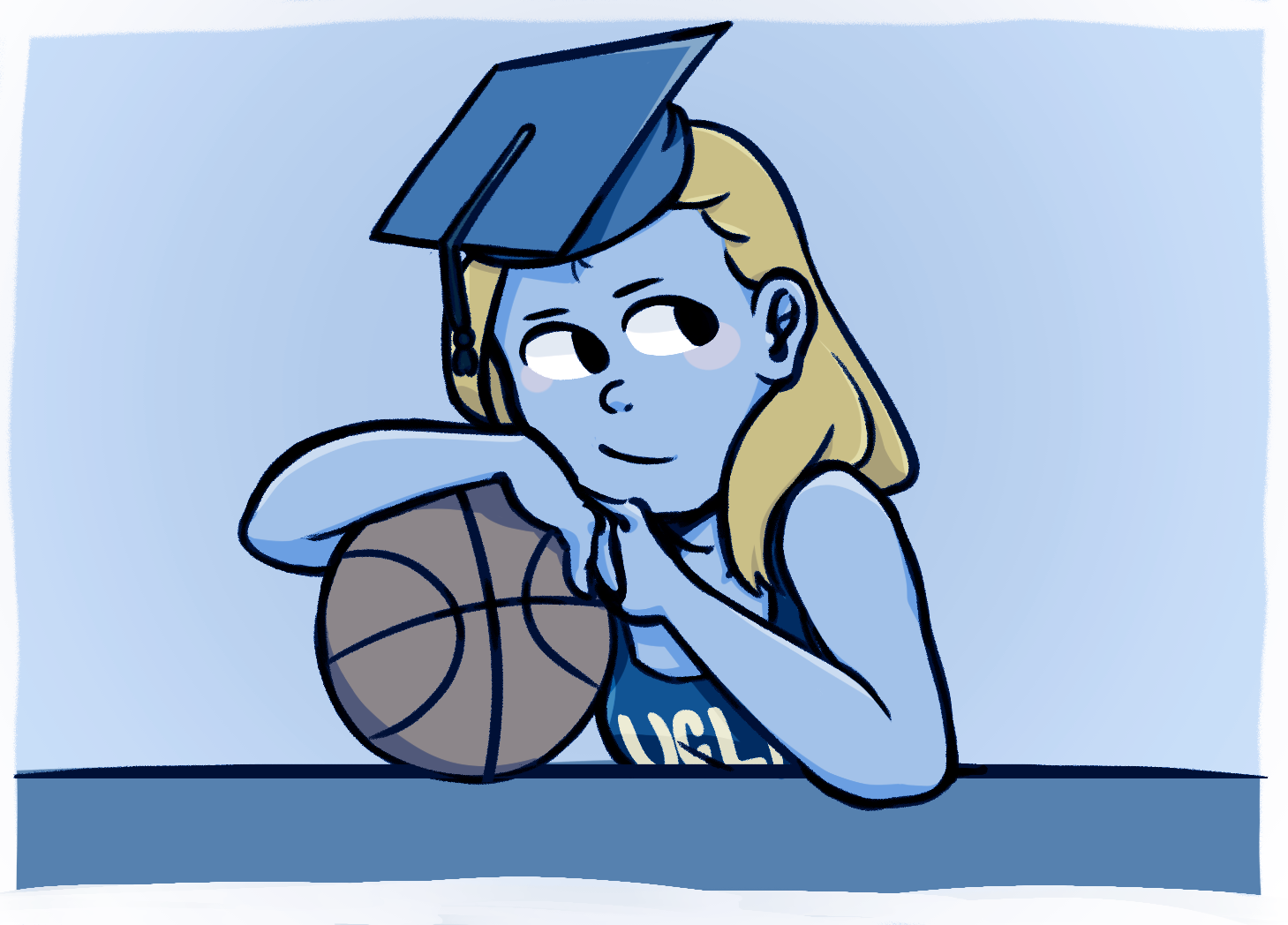Tailored major could boost job prospects, graduation rates for student-athletes

(Bridgette Baron/Daily Bruin)
By Trevor Child
Feb. 25, 2019 10:26 p.m.
Most people come to college first to get their degrees and second to pursue other activities. For student-athletes, it’s the other way around – and UCLA seems intent on keeping it that way.
At its most fundamental level, college exists to prepare students for productive postgraduation lives by teaching them skills they will use professionally.
At UCLA, future authors can hone their writing skills studying English or history. Budding businesspeople can develop their accounting knowledge in the business economics major. Burgeoning instrumentalists can perfect their musical abilities in the music performance program.
Aspiring sports stars? Probably a liberal arts degree that has nothing to do with their careers.
With 116 national championships, it is not a stretch to say UCLA possesses one of the most storied and robust athletic organizations in the NCAA. UCLA consistently recruits exceptionally talented athletes, each with unique experiences and abilities.
Student-athletes practice for dozens of hours every week and travel throughout the country for games, largely owing to UCLA Athletics’ strong national profile – and the large sums of money it generates. This means student-athletes often miss classes and don’t have much time to study. The effects of these constraints can be striking: In 2011, the gap between graduation rates for regularly attending male students and male basketball players in major conferences, for example, sat at 32.4 percent.
UCLA’s academic resources and opportunities fail to sufficiently accommodate athletes’ schedules and nurture the unique traits they have demonstrated for the greater part of their lives. It’s time for the university to consider introducing a course of study for student-athletes that focuses on careers in athletics.
The NCAA has made a big deal of improving student-athletes’ graduation rates, which has historically been an issue in collegiate athletics. But at schools in the so-called “Power Five” conferences, which includes the Pac-12, student-athlete graduation rates have always been especially poor. Within these conferences, the 69 percent student-athlete graduation rate still lags behind the 76 percent rate for all undergraduates at these schools.
These conferences are united by their public profiles. They feature the most-viewed games, and their athletics departments generate hundreds of millions of dollars. It’s alarming that the most integral component of these programs – the athletes, who are supposedly being compensated for their labor with an education – are often given little time to focus on completing their degrees or receive them at all.
Shana Wilson, a senior associate athletic director, said UCLA’s rigorous academic standards are factored in when coaches determine which athletes to recruit.
“Once they are enrolled in school, like all students on campus, student-athletes have access to college academic counseling, academic support, student-athlete development and student services,” Wilson said.
But even the best tutors cannot compensate for the sheer amount of time and energy athletes devote to participating in their sport and improving the university’s brand. Even UCLA Athletics’ newly announced $35-million study center is merely an expensive Band-Aid covering up a far more fundamental problem. Universities and the NCAA claim the education student-athletes receive is fair compensation for their efforts on the field, yet fail to acknowledge that the rigorous demands of college athletics often severely cut short players’ academic experiences.
Ensuring all students are able to derive value from a UCLA education should be a top priority for the university. If a college degree is to be student-athletes’ only form of compensation, it seems only fair that UCLA strives to offer them the chance to complete coursework that is relevant to their field – literally.
A template for what an athletics-based academic program might look like is the music performance major. Instrumentalists, much like athletes, possess a very specialized skill set that allows them to enter professional fields more traditional students don’t. Students in the program take classes almost exclusively geared toward music, and there is a heavy emphasis on live performance and critique. Since UCLA is clearly willing to offer a major that caters to a very specific profession, there is little reason why there shouldn’t be a similar program for student-athletes seeking to learn the intricacies of athletics – personal finance, consulting, coaching and so on.
Andrew Larkin, an assistant men’s golf coach at UCLA, said he believes the introduction of a specialized course of study for athletes would be beneficial.
“I personally believe it would be better coming from the NCAA and required through athletic departments rather than individual universities,” Larkin said.
It’s also worth considering that an overwhelming number of student-athletes at UCLA will not become professional athletes after college. A degree is supposed to offer a sort of insurance athletes can fall back on if their professional aspirations are not realized. Yet over a quarter of Power Five college athletes do not even graduate.
Admittedly, there have been past incidents that question the legitimacy of an athletics-based academic program. Take the University of North Carolina at Chapel Hill, for instance, where athletes were given grades they had demonstrably not earned, showing just how an improperly supervised athletics departments can permit academic misconduct.
But if anything, this scandal should raise serious questions about the academic environment student-athletes are forced into. If universities are truly recruiting athletes that are prepared on paper for their academic programs, failures such as UNC’s indicate the mishandling of student-athletes’ educations and that the educational paradigm for athletes is unsustainable.
Universities already go through painstaking efforts to ensure student-athletes perform on the field. It’s about time they gave them a diploma to help them off it too.


